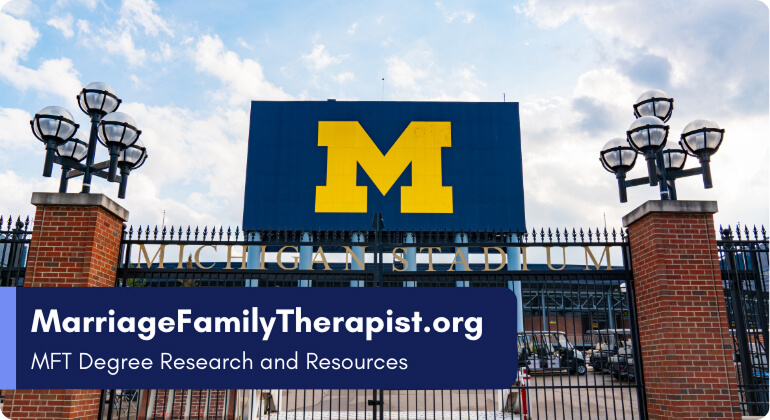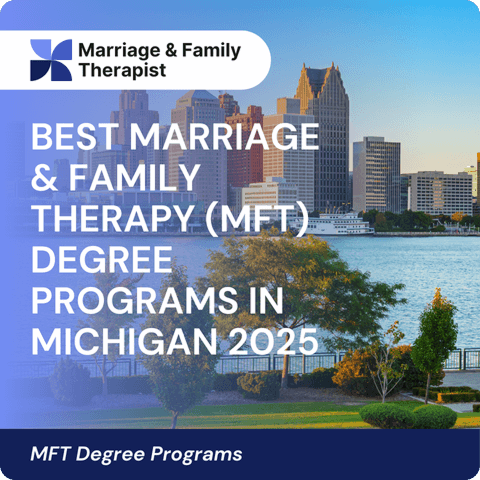Best Marriage & Family Therapy (MFT) Degree Programs in Michigan 2025
Pursuing a Marriage and Family Therapy (MFT) degree in Michigan provides students with access to high-quality education, diverse clinical training experiences, and strong career prospects. As Michigan faces a growing demand for licensed mental health professionals, particularly in rural areas and urban centers like Detroit and Grand Rapids, LMFTs play a crucial role in supporting individuals, couples, and families struggling with mental health concerns.
Michigan’s MFT programs emphasize evidence-based therapy techniques, trauma-informed care, addiction counseling, and child and adolescent mental health treatment. Students are required to complete supervised practicum and internship placements, which take place in community mental health centers, hospitals, private practices, and school-based therapy programs.
With a variety of program formats, including traditional on-campus, hybrid, and fully online degrees, Michigan offers flexible options for working professionals, career changers, and full-time students. Graduates of MFT programs in the state are well-equipped to pursue licensure and professional practice in private practice, healthcare organizations, and state-funded mental health programs.
In this guide
2026 Best Marriage & Family Therapy (MFT) Programs in Michigan
Western Michigan University
Kalamazoo, MI - Public 4-Year - wmich.edu
Master's - M.A. in Marriage, Couple, and Family Counseling
Online & Campus Based - Visit Website
Western Michigan University's M.A. in Marriage, Couple, and Family Counseling is a comprehensive 60-hour hybrid program that trains students to address complex family dynamics using a family systems approach. Designed for psychology graduates with a minimum 3.0 GPA, it provides extensive clinical training through on-site clinics in Kalamazoo and Grand Rapids. Students gain hands-on experience for licensure as professional counselors or marriage and family therapists, preparing for a growing field. The program requires an entrance exam for admission.
- 60-hour master's program
- Family systems approach
- 3.0 GPA minimum requirement
- On-site clinics Kalamazoo/Grand Rapids
- Licensure pathway options
- Mostly in-person instruction
- Hybrid/online course options
- Collaboration with Family Sciences
Michigan State University
East Lansing, MI - Public 4-Year - msu.edu
Doctorate - Ph.D. in Couple and Family Therapy
Campus Based - Visit Website
Michigan State University's COAMFTE-accredited Ph.D. in Couple and Family Therapy is a rigorous doctoral program that emphasizes relational processes and clinical research. Students engage in empirically-supported interventions and advanced research methodologies under the mentorship of expert faculty, with a strong focus on social justice. This program prepares graduates for impactful careers in academia, research, and clinical practice. As a doctorate-level program, it requires an entrance exam such as the GRE for admission.
- COAMFTE-accredited doctoral program
- Focus on relational processes
- Empirically-supported interventions
- Clinical research methodology training
- Interdisciplinary scholarship approach
- Mentorship with expert faculty
- Social justice research orientation
Andrews University
Berrien Springs, MI - Private 4-year - andrews.edu
Graduate Certificate - Couple and Family Therapy Certificate
Campus Based - Visit Website
Andrews University's Graduate Certificate in Couple and Family Therapy is a post-master's program that enhances clinical skills for mental health professionals. It requires 20 credit hours and includes an advanced internship, focusing on family dynamics, sexual health issues, and specialized therapy techniques. The program meets Michigan licensure requirements for Limited License Marriage and Family Therapists, offering legal, ethical, and practice management training. As a certificate program, it does not require an entrance exam. Designed for small cohorts of at least seven students annually, it provides a strategic pathway for professional advancement in marriage and family therapy.
- Post-master's certificate program
- 20 total credit hours
- Meets Michigan licensure requirements
- Minimum 7-student cohort annually
- Advanced internship included
- Prerequisite master's degree required
- Covers family dynamics, counseling
- Legal and ethical training
- Practice management courses
- Specialized therapy techniques
Other MFT Programs Available in Michigan
Michigan offers several COAMFTE-accredited and regionally accredited MFT programs, ensuring that students receive training aligned with state and national licensure requirements.
MFT programs in Michigan cover key areas of clinical practice, such as relationship dynamics, psychological assessment, ethical therapy practices, and mental health advocacy. Many universities integrate real-world training opportunities into their curriculum, ensuring that students graduate with practical experience in therapeutic settings.
Graduates from Michigan’s MFT programs frequently find employment in state-funded mental health programs, nonprofit counseling centers, and school-based therapy services, helping to address the statewide need for behavioral health professionals.
Eastern Michigan University – Marriage and Family Therapy (MS)
- COAMFTE accredited.
- Emphasis on systemic thinking, clinical skills, and research.
- Required clinical practicum experiences.
- Prepares for Michigan LMFT licensure.
- Not COAMFTE Accredited
- Emphasizes skill development in working with diverse clients.
- Prepares students for licensure as a LLMFT.
Michigan’s Quickest MFT Programs
Some universities in Michigan provide accelerated pathways for MFT students, allowing them to complete their degree in as little as two years. These programs often integrate practicum and clinical supervision early, enabling students to fulfill supervised experience requirements while completing coursework.
For students needing flexibility, hybrid and online programs allow them to take additional courses per semester while maintaining their professional obligations. Some universities accept transfer credits from previous graduate-level psychology or counseling coursework, which may reduce the total credit hours required for graduation.
Since Michigan has a well-established mental health infrastructure, students have access to numerous internship and practicum placement opportunities at mental health clinics, private therapy practices, and hospitals, allowing them to gain hands-on clinical experience efficiently.
Michigan’s Cheapest MFT Programs
The cost of pursuing an MFT degree in Michigan depends on the institution, program type, and available financial aid. Public universities offer more affordable tuition rates for in-state residents, making them a cost-effective choice for many students.
Many MFT programs in Michigan provide financial aid options, including scholarships, assistantships, and grants, reducing the financial burden on students. Hybrid and online learning models also help reduce costs by allowing students to continue working while earning their degree.
For those committed to working in underserved communities, Michigan offers loan forgiveness programs for LMFTs who practice in state-funded mental health clinics, rural therapy centers, and addiction treatment facilities. These programs help reduce student debt while supporting public mental health initiatives.
How to Become Licensed as an LMFT in Michigan
Step 1: Earn a Master’s or Doctorate in Marriage and Family Therapy
The first step to becoming an LMFT in Michigan is earning a graduate degree from a COAMFTE-accredited or state-approved MFT program. Coursework must include clinical training in psychotherapy, family systems, ethics, and mental health assessment.
Step 2: Complete 1,000 Hours of Supervised Clinical Experience
Michigan requires LMFT candidates to complete 1,000 hours of post-graduate supervised experience, with at least 500 hours of direct client contact. These hours must be completed under a licensed MFT supervisor, ensuring that candidates develop strong clinical skills in therapy and counseling.
Step 3: Pass the National MFT Examination
All applicants must pass the Association of Marital and Family Therapy Regulatory Boards (AMFTRB) National MFT Exam, which assesses an individual’s clinical competency, ethical decision-making, and ability to diagnose and treat relational issues.
The exam ensures that LMFTs in Michigan meet national standards for providing effective therapy.
Step 4: Apply for Licensure Through the Michigan Board of Counseling
After fulfilling all educational and clinical requirements, candidates must submit their official transcripts, verification of supervised hours, national exam scores, and background check to the Michigan Board of Counseling. Once approved, applicants receive their LMFT license, allowing them to practice independently in the state.
Step 5: Maintain Licensure Through Continuing Education
To renew their license, LMFTs in Michigan must complete 30 continuing education (CE) hours every renewal cycle, including courses in legal and ethical training, trauma-informed therapy, and specialized mental health treatment approaches.
Ongoing education ensures that therapists remain updated on best practices, emerging treatment techniques, and changes in regulatory standards.
LMFT Career & Salary Outlook in Michigan
LMFTs in Michigan play an essential role in mental health services across the state, working in private practices, healthcare organizations, community mental health agencies, and schools. The average salary for LMFTs in Michigan is $62,400 per year, with experienced professionals earning over $90,000 annually.
Salaries for LMFTs vary based on location, specialization, and work setting. LMFTs practicing in major cities like Detroit, Grand Rapids, and Ann Arbor tend to earn higher salaries due to increased demand for mental health services. Additionally, those who specialize in addiction counseling, trauma recovery, or child and adolescent therapy often have access to higher-paying positions.
Michigan has also seen a rise in teletherapy services, expanding job opportunities for LMFTs in remote therapy and hybrid mental health services. With the state continuing to prioritize mental health accessibility, licensed therapists are expected to see strong job stability and career growth in the coming years.
Michigan offers high-quality MFT programs, structured licensure pathways, and diverse career opportunities, making it a top choice for students pursuing a career in marriage and family therapy. With varied learning options, financial aid availability, and growing mental health initiatives, Michigan provides a strong foundation for aspiring LMFTs.


Related Articles
- Who Will You Treat as a Marriage & Family Therapist? A Career Guide for Aspiring MFTs
- LMFT vs MFT: Is Licensure Necessary for Your Therapy Career?
- From Student to Therapist: What to Expect in Your MFT Clinical Internship
- Support That Affirms: Navigating Mental Health as LGBTQ+
- MFT Doctorate Degrees: DMFT vs PhD – Who Should Pursue Each Path?
- The ROI of an MFT Degree: Analyzing the Financial Investment in Your Therapy Career